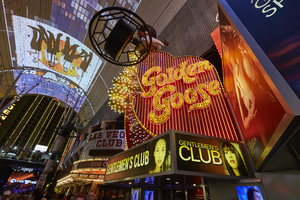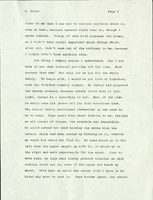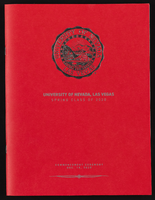Search the Special Collections and Archives Portal
Search Results

Photographs of Golden Goose sign, Las Vegas (Nev.), June 24, 2016
Date
Archival Collection
Description
Sign owner: Derek and Greg Stevens
Sign details: The Golden Goose is next to Glitter Gulch. This now closed property has a long history in Las Vegas. In 1959, the Fortune Club was where the Glitter Gulch would soon replace it. For the history of the Golden Goose: Herb Pastor bought the Mecca Club from Sylvia Sioratta in 1974 then opened up the Golden Goose soon after. Mr. Reed's was the property that sat next to the Golden Goose at this time; however, that then became Bob Stupak's Glitter in 1980. In 1981, Pastor ended up buying the Glitter Gulch. In 1991, Pastor merged both of these properties into a strip club. Both of these properties ultimate closed in the summer of 2016. The signage was taken down in 2017.
Sign condition: 3, the Golden Goose signage is still on Fremont Street and in good condition.
Sign form: Blade and sculptural sign
Sign-specific description: Perched atop the signage for the Golden Goose is a sculptural goose made out of fiberglass wearing a brown cowboy hat and red scarf around its neck with white polka dots all over it. In its right hand it hold a golden egg covered in incandescent light bulbs, which looks just like the eggs surrounding the bottom of the goose. Under the goose and the eggs surrounding it is a base that has a yellow border on the top and bottom of it and yellow incandescent light bulbs lining these lines. In the center is an orange band. The main portion of the signage for the Golden Goose is an interesting organic shape in a red/brown color that curves inward at in the middle top of the sign and in the middle side of the sign that faces Fremont. The edge of the sign that faces Fremont Street is lined with ten golden eggs that look just like the ones surrounding the goose; however, these vary in size and do not line all the way down the entire sign. This edge of the sign also has red incandescent light bulbs covering it. Each side of the sign is lined with a yellow line that outlines the sign and incandescent light bulbs are part of that line as well. "Golden Goose" is in a stylish mustard yellow font with made up of open channel letters filled with incandescent light bulbs. This sign is also lined with neon tubes that run up and down the sign and oscillate at night.
Sign - type of display: Neon, incandescent, back lit
Sign - media: Steel, plastic, fiberglass
Sign - non-neon treatments: Fiberglass and back lit plastic
Sign animation: Neon tubes lining the Golden Goose sign oscillate.
Sign environment: These signs sit in the midst of the excitement on Fremont Street Experience. Some of the other properties that sit near them are Binion's, Golden Gate Hotel & Casino, and the Plaza Hotel & Casino.
Sign - date of installation: About 1974
Sign - date of redesign/move: The Golden Goose sign was removed from Fremont in 2017.
Sign - thematic influences: Both of the Golden Goose and Glitter Gulch signs are extremely iconic signs in Las Vegas history and combine elements that are typically used in signage throughout the city, such as: sculptural signage and signs that have a dominant theme for the property. The signage for the Golden Goose features a sculpture of a goose to drive the theme of the property to motorists and pedestrians. They are elaborately designed to draw people's attention to these businesses, which many other signs throughout the city aim to do as well.
Sign - artistic significance: These sign are significant because the design of them is elaborate and they are excellent examples of signs that use sculpture/image to help convey the theme of the property. They are also crafted in such an excellent manner and filled with numerous details.
Survey - research locations: Fox news website http://www.fox5vegas.com/story/31783315/d-las-vegas-owner-buys-3-more-fremont-properties , Vintage Las Vegas website http://vintagelasvegas.com/search/glitter+gulch, Review Journal Article https://www.reviewjournal.com/business/casinos-gaming/mermaids-la-bayou-and-glitter-gulch-come-to-a-close-on-fremont-photos/
Surveyor: Lauren Vaccaro
Survey - date completed: 2017-09-17
Sign keywords: Blade; Sculptural; Neon; Incandescent; Backlit; Plastic; Oscillating; Steel; Fiberglass
Mixed Content

Irma I. Varela interview, March 5, 2019: transcript
Date
Archival Collection
Description
Interviewed by Barbara Tabach. Born and raised in Zacatecas, Mexico, Irma moved to Las Vegas in 1989. She is the Cultural Program Supervisor at Winchester Community Center and has devoted much of her career to preserving Hispanic cultural traditions in Las Vegas. She has been an active leader in local events such as Community Roots, International Food & Folk Life Festival, World Vibrations, and Dio de Los Muertos.
Text

Transcript of interview with Miriam "Mimi" Katz by Barbara Tabach, December 10, 2014
Date
Archival Collection
Description
In this interview, Mimi Katz discusses growing up in the Boston area and her schooling, and moving to Washington, D.C. working as a physiotherapist. She returned to Boston and met her husband, and she talks about moving to Las Vegas and adjusting to life here. They became involved at Temple Beth Sholom, and Mimi worked as a conventions coordinator at the Sands and the Sahara. She discusses moving around in Las Vegas from an apartment to a house in the John S. Park neighborhood, working for the Jewish Federation, and helping to develop the Holocaust education program with Edythe Katz, conducting oral history interviews with survivors. She continued working at the Convention Center in the 1980s, and is involved in the Lou Ruvo Center.
Everyone knows her as Mimi. She was born Miriam Green to immigrant parents in Boston, Massachusetts, in 1926. As a youngster she danced, excelled at school and enjoyed an abundance of sports. To pay for her higher education at Massachusetts School of Physiotherapy she worked at Raytheon Manufacturing. In 1957 she married George Katz who swept her away to their honeymoon in Las Vegas. It's a story that she loves to recall-they never left. She sent for her things and energetically settled in to her new hometown and marriage. Mimi found employment with the Clark County School District, began having children (three daughters), and making fast new friends. Many of these friends were from the founding days of Temple Beth Sholom, which roots her to the history of the local Jewish community. In addition, for a decade she worked in community relations for the Jewish Federation. She valued community activism and volunteered over the years for many organizations; such as Easter Seals, Jewish War Veterans, Parent Teachers Association and the Lou Ruvo Center for Brain Health, and many more organizations over the subsequent decades.
Text

Chapter from autobiography by Bella Stern, 1980
Date
Archival Collection
Description
In this chapter, Stern describes her upbringing in Russia and fleeing to Poland. It is accompanied by a letter to the publishing company William Morrow.
Text
Punam Mathur (Elaine Wynn Foundation) oral history interview conducted by Kelliann Beavers and Elia Del Carmen Solano-Patricio: transcript
Date
Archival Collection
Description
From the Lincy Institute "Perspectives from the COVID-19 Pandemic" Oral History Project (MS-01178) -- Community organization interviews file.
Text

University of Nevada, Las Vegas (UNLV) Spring 2020 commencement program
Date
Archival Collection
Description
Commencement program from University of Nevada, Las Vegas Commencement Programs and Graduation Lists (UA-00115).
Text

Nympha Comacchio oral history interview: transcript
Date
Archival Collection
Description
Oral history with Nympha Comacchio conducted by Cecilia Winchell and Stefani Evans on May 09, 2022 for the Reflections: the Las Vegas Asian American and Pacific Islander Oral History Project. In this interview, Comacchio recalls her childhood in the Philippines and growing up in a large family. After attending elementary school, Comacchio immediately went to work on her father's lumber farm, performing manual labor until she was seventeen. Later, she recalls finding employment as a seamstress in Manila, where she met her first husband when she left to work in Saudi Arabia for better pay. Comacchio describes how she was able to receive a student visa to finally immigrate to the United States, where she first arrived in California. Eventually, after meeting her second husband and hearing about housing prices in Las Vegas, Nevada, they purchased a house in the city in 2000. After briefly working for the New Frontier, Comacchio began working for the Wynn and Encore, where she found out about the Culinary Workers Union and became more active in that organization. Throughout the rest of the interview, Comacchio touches on the responsibilities of being a housekeeper, the current challenges they face, and how she feels about the growing AAPI population in southern Nevada.
Text
Skaggs, Robert L.
Dr. Robert Skaggs was born April 2, 1932 and grew up around the St. Louis, Missouri area. His father was a teamster with a milk delivery route, tried his hand at the restaurant business, and during World War II worked for the United States Cartridge. Several members of Skaggs’s family were teachers, including his grandmother and a couple of aunts. Skaggs graduated from Normandy High School and afterwards attended the Missouri School of Mines and majored in metallurgical engineering. He graduated in 1954 and went to work for DuPont University for two years.
Person
Henderson, Betty, 1923-1985
Betty Henderson was a private music teacher in Las Vegas, Nevada and dedicated member of the Nevada Music Teachers Association. She was born on January 23, 1923 in Portland, Indiana. She wanted to pursue a career in music and enrolled at the Cincinnati Conservatory of Music, but was forced to drop out after she started to become deaf. She married Charles B. Henderson, a civil engineer, in 1948 and moved to Las Vegas, Nevada. She had many different jobs in the city including secretary and company auditor.
Person
Morlan, Jerry Duane, 1938-2000
Jerry Duane Morlan (1938-2000) was born and raised in Victorville, California. He worked as a letter carrier for the U.S. Post Office from 1960 to 1965 before his eight-year tenure as an industrial photographer at Teledyne Semiconductor in Hawthorne, California. After Teledyne, Morlan was a successful general supervisor of the graphic arts department of leading toy manufacturing company Mattel, continuing to work as a photographer and sometimes acting as a consultant for the Yankee Photo Products company.
Person
